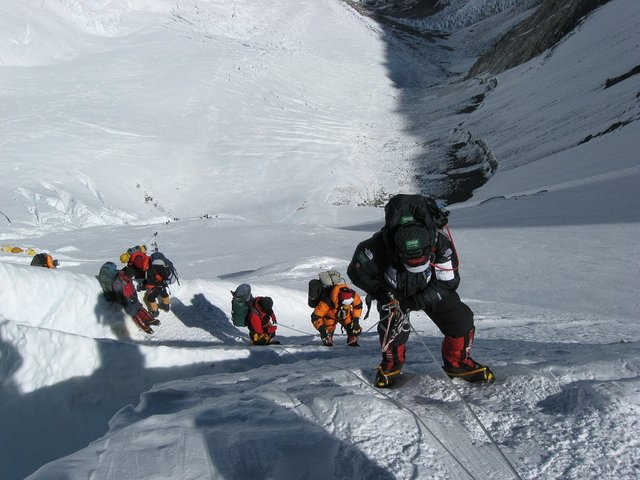Ascending Everest: Why mountaineers hear voices
Hello dear steemians......
The mountain makes her crazy? If we believe the many stories that bear witness to psychotic phenomena at very high altitude, it can indeed promote hallucinations. European researchers who have studied these events describe a new medical condition: "high altitude isolated psychosis".
When Jeremy Windsor climbed Mount Everest in 2008, he had a curious experience. At over 8,200 meters above sea level, he met a man, Jimmy, who accompanied and encouraged him, before disappearing without a trace. Here's what he says: "I first met Jimmy on the balcony, a cold, windswept plateau of snow on the southeastern ridge of Mount Everest. At an altitude of over 8,200 meters, our presentation was brief, with little more than a muffled "salute" and a few words of encouragement passing between us. Above my right shoulder, masked by the voluminous oxygen mask and the bottom rim that covered my face, I was sure I could see Jimmy move slightly in the darkness. But although he stayed close to me for the rest of the day, I did not see him again. "
This story is not an isolated case. Mountain literature is full of examples where a mountaineer makes foolish remarks or changes directions for no reason ... This phenomenon can be beneficial if the mountaineer hears voices that encourage him. But these hallucinations and loss of contact with reality remain dangerous, as they lead to errors in judgment and can lead to life-threatening accidents.
Unusual behaviors and hallucinations at extreme altitudes are usually attributed to mountain sickness. Because the symptoms often appear at the same time as major headaches, nausea, balance problems, which are due to high altitude cerebral edema.
Doctors from Eurac (Italy) and Innsbrück Medical University wanted to conduct a thorough investigation of these psychotic episodes. For their research, published in Psychological Medicine, Katharina Hüfner and Hermann Brugger collected 80 psychotic episodes from German mountain literature.
High altitude isolated psychosis is temporary
The researchers analyzed the symptoms to describe a new medical condition: high altitude isolated psychosis. Hermann Brugger explains in a statement: "In our study, we found that there was a group of symptoms that are purely psychotic; that is, although they are indeed related to altitude, they can not be attributed to high altitude cerebral edema or other organic factors such as fluid loss, infection or organic diseases ".
Isolated psychosis of high altitude appears rather above 7,000 m altitude. It could be related to lack of oxygen. The symptoms disappear completely when the individual returns to a lower altitude. There are no long-term sequels.
For Katharina Hüfner, "this discovery has allowed us to do more research on temporary psychoses in otherwise healthy people, research that could provide important insights into understanding psychiatric illnesses such as schizophrenia."
It is important for climbers to be aware of this phenomenon in order to avoid mountain accidents. Next year, researchers are planning a collaboration with Nepalese doctors to continue their work in the Himalayas.
Source: http://time.com/5069436/mountain-climbing-high-altitude-psychosis/
